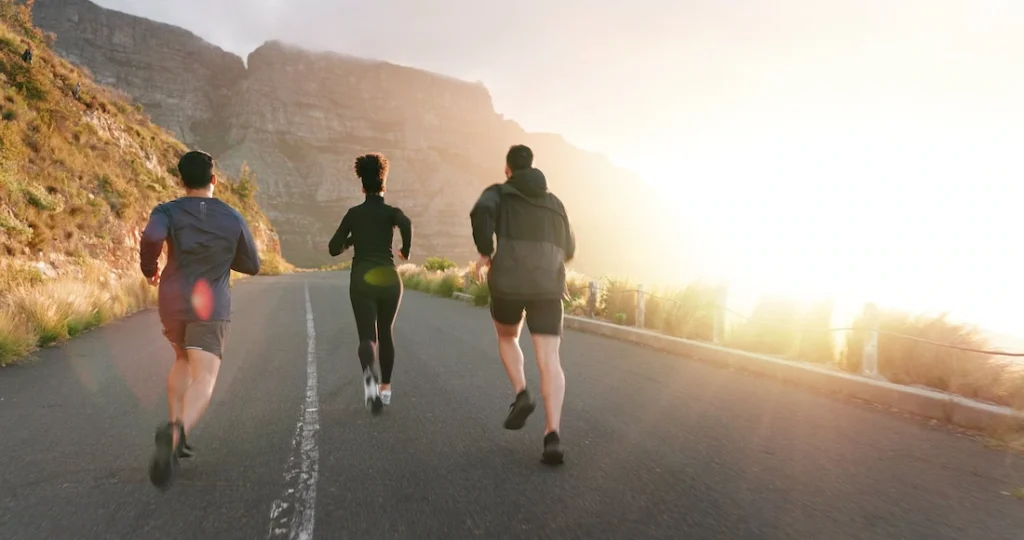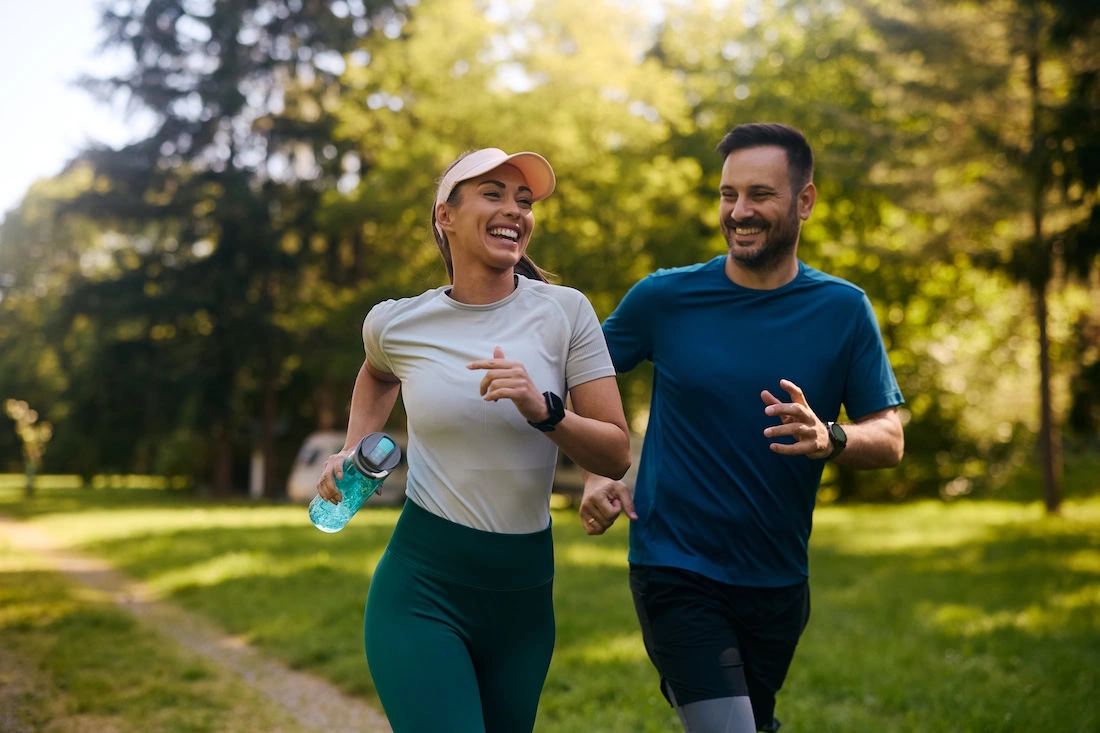Early recovery can feel like an uphill battle—your body is healing, emotions are raw, and cravings test your resolve. But one of the most powerful tools to support your journey is already within reach: exercise. Far more than just physical activity, movement becomes medicine in recovery, helping to:
- Rebalance brain chemistry
- Regulate emotions
- Rebuild confidence
At Roaring Brook Recovery, we integrate movement and wellness into our services because true healing happens when we care for the whole person. From encouraging mindful hiking in Kentucky’s natural beauty to using breathwork to center your nervous system, every step forward counts.
We’ll talk about how the science-backed benefits of exercise in addiction recovery can transform your journey.
5 Key Benefits of Exercise in Addiction Recovery
While clinical therapies address the psychological aspects of addiction, exercise serves as a powerful complementary tool for whole-person healing.
Research shows that regular physical activity can accelerate recovery by addressing some of the most common challenges in early sobriety—from neurotransmitter imbalances to emotional regulation. These five benefits demonstrate why movement is medicine for your recovery journey:
1. Boosts mood & reduces anxiety
Exercise naturally replenishes dopamine and serotonin, the neurochemicals depleted by substance use. This helps improve mood and reduce depression.
Exercise also reduces stress and anxiety, helping you to feel more relaxed and less tense. Even 20 minutes of walking can lower cortisol (the stress hormone) levels, offering immediate relief from anxiety and stress symptoms common in early recovery.
2. Improves sleep quality
Substance use disrupts circadian rhythms, making it difficult to fall asleep or stay asleep. But regular physical activity helps reset your body’s natural sleep-wake cycle. Better sleep means:
- Improved decision-making
- Emotional resilience
- Reduced relapse risk
As sleep patterns normalize, clients often experience improved mental clarity and reduced irritability. This restorative sleep is especially crucial during the first months of recovery when the brain is healing.
3. Builds structure & routine
A consistent exercise schedule creates anchors in your day, replacing old habits with healthy rituals. Whether it’s morning hikes or evening gym sessions, this predictability fosters stability when other aspects of recovery feel overwhelming.
The discipline of regular exercise often translates to other areas of life, helping clients maintain therapy schedules and sober commitments. These small daily victories build confidence in one’s ability to create positive change.
4. Promotes physical healing
Substance use can damage your heart and lungs, deplete your energy, and make you feel unwell overall. Cardiovascular exercise reverses damage to your heart and lungs, while strength training rebuilds muscle mass lost during active addiction.
As physical health improves, clients often experience reduced chronic pain and increased mobility, which decreases reliance on pain medications. This physical transformation provides visible, tangible evidence of recovery progress.
5. Enhances mental focus & craving management
Mindful movement (like yoga or tai chi) trains your brain to stay present, reducing impulsive reactions to cravings. Combined with our clinical therapies, exercise becomes a grounding tool for navigating triggers in real time. The focus required during physical activity creates a “flow state” that provides a break from obsessive thoughts about substance use. Over time, clients learn to channel restless energy into productive movement rather than cravings.
Roaring Brook’s Holistic Approach
Roaring Brook Recovery recognizes the profound benefits of exercise in addiction recovery, which is why movement therapies are woven into treatment plans. Our Kentucky location and trauma-informed approach allow us to offer unique, clinically integrated wellness experiences that heal mind, body, and spirit simultaneously.
Mind-body integration
Recovery requires reconnecting with your body as an ally rather than an enemy. Our gentle, judgment-free approach helps rebuild this essential relationship.
Guided hiking
Gentle hikes through trails combine physical activity with mindfulness practices, reducing stress while building endurance. These therapeutic hikes incorporate grounding techniques to help clients stay present, often paired with group processing sessions afterward.
Trauma-informed yoga
Gentle flows help regulate the nervous system and improve body awareness. Many clients report this is their first positive experience connecting with their bodies after years of substance abuse. The mat becomes a safe space to process emotions without words.
Breathwork classes
Evidence-based techniques (like 4-7-8 breathing) teach real-time craving management. Clients learn to use breath patterns to short-circuit anxiety attacks and cravings. These portable skills become lifelong tools for emotional regulation, with many alumni reporting they still use these techniques years later. It’s medicine you always carry with you.
Every activity is adapted to individual abilities because healing happens when movement feels empowering, not punishing. Our staff also modifies activities for injuries or limited mobility, ensuring all clients can experience the benefits of exercise in addiction recovery. Whether it’s a gentle stroll or an ambitious hike, what matters is showing up for yourself one step at a time. This is how we help rewrite your relationship with your body and with recovery itself.
Unlock Your Recovery Potential Through Movement
While exercise offers profound benefits in addiction recovery, it works best alongside professional treatment—not as a substitute. Roaring Brook Recovery weaves movement therapies into our evidence-based programs because true healing happens when we care for the whole person.
Ready to experience how holistic recovery can transform your journey? Explore our programs today by calling us or visiting our website to discover clinical care that nurtures both mind and body. Your strongest, healthiest sober life starts with one step forward.
FAQs
1. What types of exercise are best for early recovery?
Low-impact activities like walking, yoga, or swimming are ideal starting points—they’re gentle on the body while still boosting endorphins. As stamina improves, many clients graduate to hiking, cycling, or strength training.
2. Do I need to be physically fit to start exercising in recovery?
Not at all. We meet clients where they are—whether that’s chair yoga for beginners or short walks around our campus. Even 10 minutes of movement daily can yield mental health benefits. Our team helps you progress safely at your own pace.
3. How does Roaring Brook incorporate wellness into treatment?
Movement is woven throughout our programs:
- Guided hikes in Kentucky’s nature trails.
- Mindful breathwork sessions.
- Yoga/meditation groups.
These complement clinical therapies for whole-person healing.
4. Can exercise really help reduce cravings?
Yes. Physical activity releases “feel-good” neurotransmitters that diminish cravings. It provides a healthy distraction during urge episodes and restores natural dopamine production over time. Many clients use brisk walks or push-ups as immediate craving-intervention tools.
5. What if I don’t enjoy working out?
“Exercise” isn’t just gyms or running—it’s any movement that energizes you. We help clients discover enjoyable options, whether gardening, dance, or kayaking. The key is consistency, not intensity.



